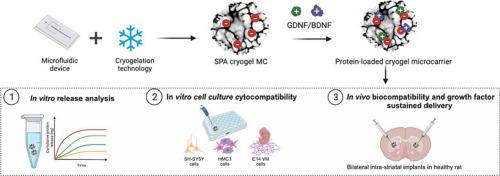当前位置:
X-MOL 学术
›
J. Control. Release
›
论文详情
Our official English website, www.x-mol.net, welcomes your feedback! (Note: you will need to create a separate account there.)
Cryogel microcarriers for sustained local delivery of growth factors to the brain
Journal of Controlled Release ( IF 10.8 ) Pub Date : 2024-04-04 , DOI: 10.1016/j.jconrel.2024.03.023 Abrar Hakami , Kaushik Narasimhan , Giulia Comini , Julian Thiele , Carsten Werner , Eilís Dowd , Ben Newland
Journal of Controlled Release ( IF 10.8 ) Pub Date : 2024-04-04 , DOI: 10.1016/j.jconrel.2024.03.023 Abrar Hakami , Kaushik Narasimhan , Giulia Comini , Julian Thiele , Carsten Werner , Eilís Dowd , Ben Newland

|
Neurotrophic growth factors such as glial cell line-derived neurotrophic factor (GDNF) and brain-derived neurotrophic factor (BDNF) have been considered as potential therapeutic candidates for neurodegenerative disorders due to their important role in modulating the growth and survival of neurons. However, clinical translation remains elusive, as their large size hinders translocation across the blood-brain barrier (BBB), and their short half-life necessitates repeated administrations. Local delivery to the brain offers a potential route to the target site but requires a suitable drug-delivery system capable of releasing these proteins in a controlled and sustained manner. Herein, we develop a cryogel microcarrier delivery system which takes advantage of the heparin-binding properties of GDNF and BDNF, to reversibly bind/release these growth factors electrostatic interactions. Droplet microfluidics and subzero temperature polymerization was used to create monodisperse cryogels with varying degrees of negative charge and an average diameter of 20 μm. By tailoring the inclusion of 3-sulfopropyl acrylate (SPA) as a negatively charged moiety, the release duration of these two growth factors could be adjusted to range from weeks to half a year. 80% SPA cryogels and 20% SPA cryogels were selected to load GDNF and BDNF respectively, for the subsequent biological studies. Cell culture studies demonstrated that these cryogel microcarriers were cytocompatible with neuronal and microglial cell lines, as well as primary neural cultures. Furthermore, studies confirmed their biocompatibility after administration into the brain, as well as their ability to deliver, retain and release GDNF and BDNF in the striatum. Overall, this study highlights the potential of using cryogel microcarriers for long-term delivery of neurotrophic growth factors to the brain for neurodegenerative disorder therapeutics.
中文翻译:

Cryogel 微载体可将生长因子持续局部递送至大脑
神经营养生长因子,如神经胶质细胞源性神经营养因子(GDNF)和脑源性神经营养因子(BDNF),因其在调节神经元生长和存活中的重要作用而被认为是神经退行性疾病的潜在治疗候选者。然而,临床转化仍然难以捉摸,因为它们的大尺寸阻碍了穿过血脑屏障(BBB)的易位,并且它们的半衰期短需要重复给药。局部递送至大脑提供了到达目标部位的潜在途径,但需要合适的药物递送系统,能够以受控和持续的方式释放这些蛋白质。在此,我们开发了一种冷冻凝胶微载体递送系统,该系统利用 GDNF 和 BDNF 的肝素结合特性,可逆地结合/释放这些生长因子的静电相互作用。使用液滴微流体和零下温度聚合来制造具有不同程度的负电荷且平均直径为 20 μm 的单分散冷冻凝胶。通过定制丙烯酸 3-磺基丙酯 (SPA) 作为带负电荷的部分,这两种生长因子的释放持续时间可以调整为几周到半年。选择80%SPA冰凝胶和20%SPA冰凝胶分别负载GDNF和BDNF,用于后续的生物学研究。细胞培养研究表明,这些冷冻凝胶微载体与神经元和小胶质细胞系以及原代神经培养物具有细胞相容性。此外,研究证实了它们在注入大脑后的生物相容性,以及它们在纹状体中递送、保留和释放 GDNF 和 BDNF 的能力。总体而言,这项研究强调了使用冷冻凝胶微载体向大脑长期递送神经营养生长因子以治疗神经退行性疾病的潜力。
更新日期:2024-04-04
中文翻译:

Cryogel 微载体可将生长因子持续局部递送至大脑
神经营养生长因子,如神经胶质细胞源性神经营养因子(GDNF)和脑源性神经营养因子(BDNF),因其在调节神经元生长和存活中的重要作用而被认为是神经退行性疾病的潜在治疗候选者。然而,临床转化仍然难以捉摸,因为它们的大尺寸阻碍了穿过血脑屏障(BBB)的易位,并且它们的半衰期短需要重复给药。局部递送至大脑提供了到达目标部位的潜在途径,但需要合适的药物递送系统,能够以受控和持续的方式释放这些蛋白质。在此,我们开发了一种冷冻凝胶微载体递送系统,该系统利用 GDNF 和 BDNF 的肝素结合特性,可逆地结合/释放这些生长因子的静电相互作用。使用液滴微流体和零下温度聚合来制造具有不同程度的负电荷且平均直径为 20 μm 的单分散冷冻凝胶。通过定制丙烯酸 3-磺基丙酯 (SPA) 作为带负电荷的部分,这两种生长因子的释放持续时间可以调整为几周到半年。选择80%SPA冰凝胶和20%SPA冰凝胶分别负载GDNF和BDNF,用于后续的生物学研究。细胞培养研究表明,这些冷冻凝胶微载体与神经元和小胶质细胞系以及原代神经培养物具有细胞相容性。此外,研究证实了它们在注入大脑后的生物相容性,以及它们在纹状体中递送、保留和释放 GDNF 和 BDNF 的能力。总体而言,这项研究强调了使用冷冻凝胶微载体向大脑长期递送神经营养生长因子以治疗神经退行性疾病的潜力。



























 京公网安备 11010802027423号
京公网安备 11010802027423号